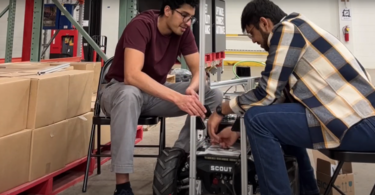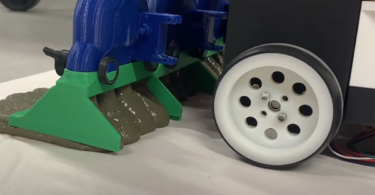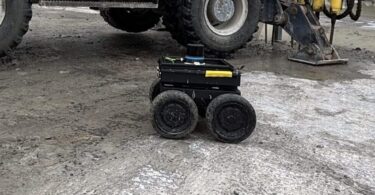SICK celebrates 75 years of history in industrial automation and reflects back on the legacy of Dr. Erwin Sick
The world is undergoing change. With digitalization, the finite nature of resources, the changing world of work, and increasing global networking – a general atmosphere of renewal is spreading. People are seeking new paths; setting off to make new discoveries and change the world and industrial automation is just a part of that puzzle. And many of these people work at SICK. We shape the world together. This has been our aspiration since Dr. Sick wanted to make the world a bit better with his inventions and founded this company in 1946.
We have learned far-sightedness, courage, and a wealth of ideas from our company founder. About 10,500 employees now represent a worldwide network of innovation and progress, quality, and dependability. Again, and again, our inventive spirit and curiosity make us set off for new shores.
Dr. Sick described himself as a “passionate inventor,” who wanted to develop “devices with flair” that “could do more than others.” In a speech in 1971, Dr. Sick said, “We definitely do not need more technology, but better and more appropriate technology.”
Our innovative strength is vital for our economic success. And innovations are only economically sustainable “if they improve the current state and anticipate future developments.” We are not interested in technology for technology’s sake, but in changing the world by improving our sensor solutions wherever we can.

Progress for the benefit of humanity
Dr. Sick founded his company when the effects of the Second World War were ever-present. Consistently supported by his wife, Gisela Sick, protecting people and the environment using sensors was his entrepreneurial drive. In addition to automation using optical technologies, Dr. Sick was, above all, motivated by machine safety. With the first light curtain, he not only developed an innovative sensor solution, but also became involved in working out safety standards and principles. He ultimately presented the first serially produced light curtain for accident prevention at the 2nd International Machine Tool Exhibition in Hanover in 1952.
The measurement of emissions was another early mainstay. Visits to the Ruhr region – and the smoking chimneys there – opened Dr. Sick’s eyes to how important it was to combine industrial automation and technical progress with a responsible treatment of the environment.
When Dr. Sick died on December 3, 1988, at the age of 79, it was Mrs. Gisela Sick who immediately signaled that she wanted to continue her husband’s life work. In her letter to the employees, she said, “We will succeed in taking Dr. Sick GmbH into the future under the proven and well-founded leadership of our management, and with their energetic cooperation.” And this has been the case ever since because the Sick family is committed to its legacy.
Growing with SICK: pioneers in many countries and specialist fields
We have succeeded by combining our forces. The founding of our first subsidiary in France in 1972 laid the foundation for the company’s international expansion. A subsidiary was founded in the USA only three years later, in 1975. More than 4,000 employees were active in the SICK Group when the company celebrated its 60-year jubilee in 2006. Over the years, SICK has repeatedly scored points with technical innovations, such as 2D and 3D camera sensors or radio-based RFID technologies. And new additions to the Group have also expanded the portfolio, for example with encoder expertise from SICK STEGMANN.
The fourth industrial revolution during the 2010s offered SICK a wide variety of new possibilities. Digitalization is only possible with sensors that provide data. The SICK team is growing again: Software experts are called for. Internal start-ups provide new thinking spaces and invite discussion. Artificial intelligence, deep learning, the connection of sensors with the cloud – new paths open to complement our business with sensors and systems.
We are not only setting off for new shores in the virtual world, but also in reality: We leave the works halls of this world and venture outside with our outdoorScan3. We enable AGV systems to navigate safely with the world’s first safety laser scanner – even the weather has become an irrelevance thanks to our new outdoor-SafeHDDM® scanning technology.
But all these new worlds are not enough for us – we dare to take a quantum leap. We are developing industrial quantum sensors with our collaboration partner TRUMPF to detect the finest of dust particles.

Diversity is a superpower
Dr. Sick believed that technological diversity was our greatest strength, and consistently expanded it. We still do this: The diverse range of applications in many markets has also made us a diverse company in cultural terms. Our community of colleagues now includes 50 subsidiaries and associated companies all over the world, and we make our products on three continents. What Dr. Sick wanted to expand into a “healthy SME with 80 to 100 selected personnel” is now a global group.
Our growing diversity is the sum of our decisions. We are experts in our own ways, in our tasks – whether specialist, technological, or cultural. But what is decisive for our success is that we bring all this diversity together and jointly work to convince our customers and partners of our capability.
We move the world forward with our sensor or industrial automation solutions – just as much now as 75 years ago. The courage, creativity, and innovative power of all our employees make this possible. We all contribute towards our pioneering superpowers.





